Woman Wants To Help A Lost Dog Find Her Owner But Ends Up Being Criticized For Fostering Her
“The way you treat the animals around you will be the nature of the animal within you,” is the perfect phrase to explain that people who love animals are of the kindness and among the gentlest ones. So when that kind of person sees an animal in need, he just has to help her.
It is unacceptable for them to pretend they didn't notice or that it didn't matter because animals are important to them. It would be nice if they could save all the animals in the world.
Unfortunately, since that is not possible, every animal is counted. So they believe it will make a difference if they could protect and save at least one at a time, but we can confirm it is.
Recently, a student came across a big black labrador while walking her dog. It was a polite, well-trained dog, she even had a collar, so the girl assumed it belonged to someone.
But there was no sign of its owner, so the student decided to take her home until she managed to find her owner. She did her best efforts, but the search was unsuccessful.
In addition to everything, she will have to leave the city for a short time, and she doesn't want to leave the poor animal on the street. Since no one claimed the dog, she started asking people on social media if anyone would love to adopt her.
But the responses were so cruel. Instead of finding the owner or a new home for the lovely dog, she got only other people's judgments.
She shared her story on Reddit and wondered if she should have thought about the consequences before fostering the poor dog.
Here's the story:

She wanted to help the dog find its owner.
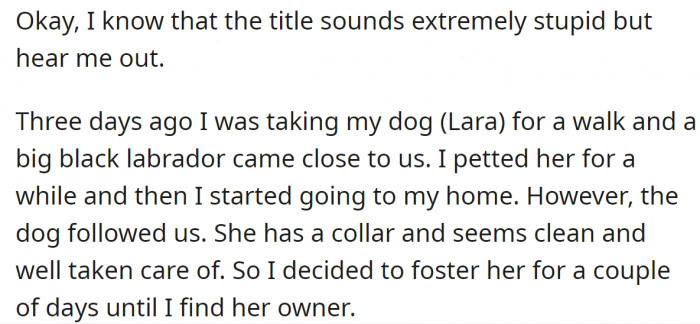
So she took the dog to her home, but she knew she couldn't keep her for long.

Motivations Behind Helping Animals
Human beings are inherently social creatures, driven by empathy and a desire to help others, including animals. Research published in the Journal of Personality and Social Psychology indicates that altruistic behavior often stems from an emotional response to seeing someone in need. This desire to assist can sometimes lead to conflicts, especially when the helping behavior is not received positively.
Understanding these motivations can help individuals navigate the complexities of their actions and the reactions they provoke in others.
The Psychology of Empathy and Altruism
Dr. Rick Hanson, a neuropsychologist, notes that "our capacity for empathy extends not only to humans but also to animals, often driving us to help those in distress." His insights suggest that many individuals feel a moral responsibility to assist lost or abandoned pets, as these actions reflect their values and character. According to Dr. Hanson, "helping others, including animals, can lead to profound feelings of fulfillment and purpose." This aligns with findings shared on his professional website, RickHanson.net, where he discusses the psychological benefits of altruism.
She did everything she could think of to find its owner, but no one claimed the dog.
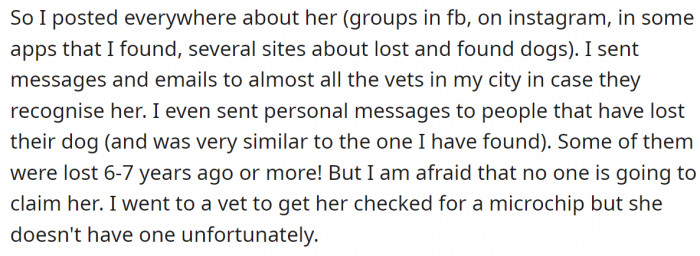
After even the shelters refused her request to take the dog, she tried to find the dog a new foster home, but...
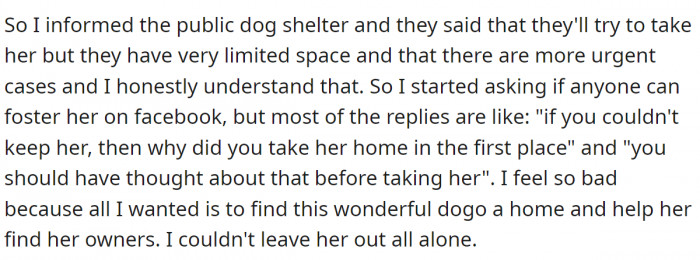
That went worst of all.
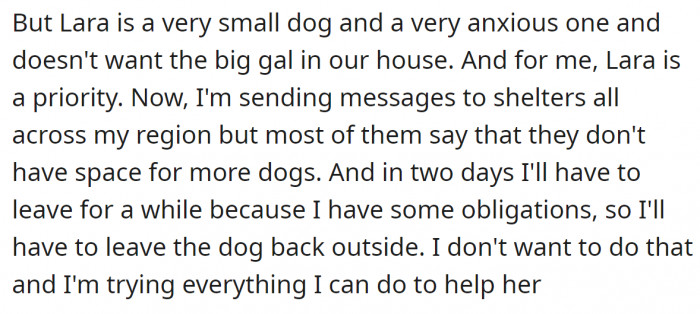
The backlash faced by individuals trying to help lost pets can be disheartening. Studies in social psychology reveal that people often react defensively when they perceive a threat to their autonomy or responsibility. In this case, the woman's attempt to help the lost dog may have inadvertently triggered feelings of inadequacy in the pet's owner, prompting criticism instead of gratitude.
However, this altruistic drive can sometimes clash with societal expectations and norms. When the actions of one person are criticized, it can discourage others from stepping up in similar situations.
Research shows that social validation plays a crucial role in encouraging or deterring altruistic behavior; when individuals believe their actions will be supported, they are more likely to act positively.
This dynamic can create a ripple effect within communities, where supportive environments foster more helping behavior.
She still hopes that she'll manage to find a new home for a lovely dog, but the second thoughts bother her:

"Good luck finding someone who can foster her!"
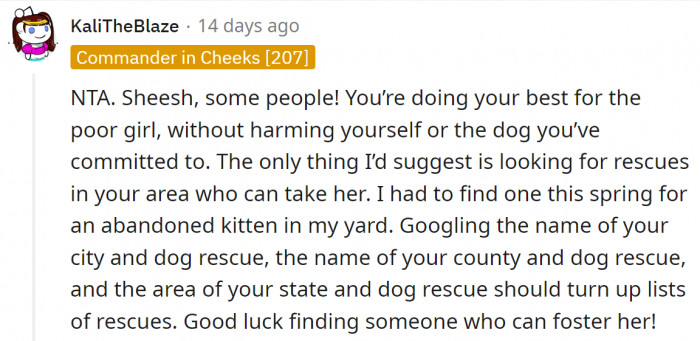
"You are never the AH for trying to help a lost or stray dog"
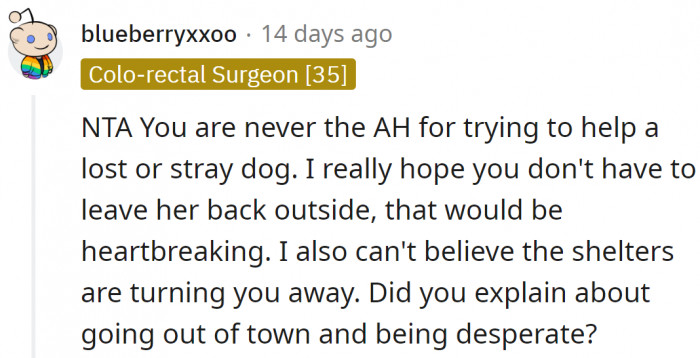
The Impact of Social Media on Perception
Social media platforms can amplify public scrutiny and judgment, particularly in situations involving animal welfare. A study from the Pew Research Center highlights how online interactions can shape our perceptions and reactions to certain behaviors. In this case, the woman may have faced criticism not just from her immediate social circle but also from a larger audience, complicating her emotional experience as she tried to do a good deed.
Conflict and Criticism in Altruistic Actions
Criticism of altruistic efforts often stems from misunderstandings or differing values regarding animal welfare.
Studies highlight that individuals have varied perceptions about the appropriate ways to care for animals, which can lead to conflicts when one person's approach is deemed unacceptable by others.
For example, some may prioritize finding the original owner while others may focus on immediate shelter for the animal, leading to disagreements.
She shouldn't mind people's malicious comments, she did the right thing.
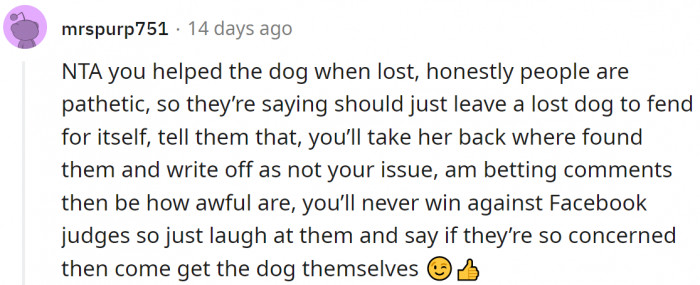
People can be so cruel and judgmental.
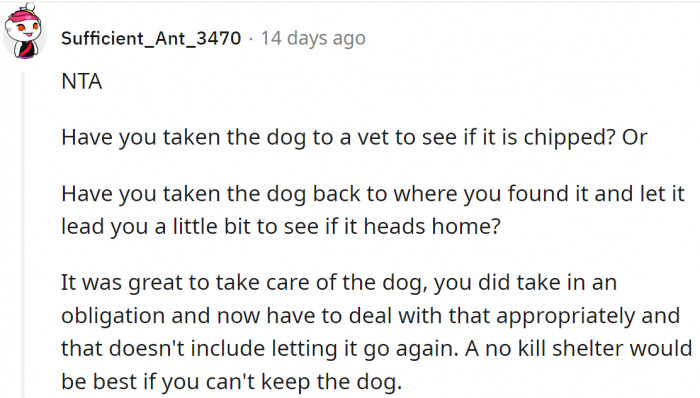
Unfortunately, the dog is not chipped, but the OP is still trying to find her owner.

To navigate such criticisms, individuals can benefit from emotional regulation strategies. Practicing mindfulness can help maintain focus on their intentions rather than dwelling on negative feedback. Additionally, seeking support from like-minded individuals can create a sense of community and reaffirm one's commitment to helping animals.
To navigate these conflicts, experts recommend open communication and establishing common goals. Engaging in discussions about community values concerning animal welfare can help align perspectives and reduce criticism.
According to a study by the American Journal of Community Psychology, communities that actively engage in dialogue about shared values often have lower rates of conflict.
Encouraging shared initiatives, such as local pet adoption events or recovery efforts for lost pets, can also foster a collaborative spirit.
Another user told her that she had adopted a kitten through Facebook posts like OP's, so there is hope.
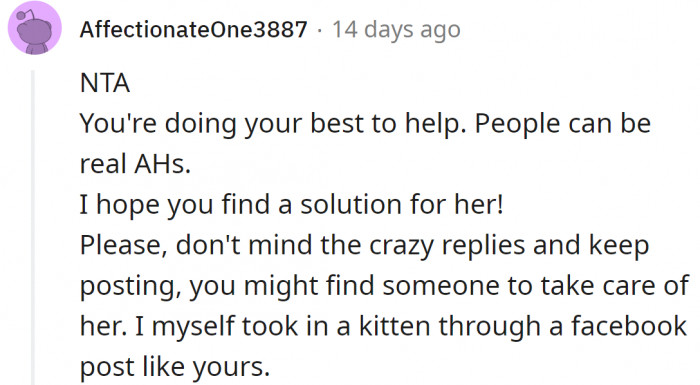
"A rare kindness these days."

Hopefully, the OP will manage to find this dog its owner or perhaps a new one. She did the right thing by taking her home, but the real struggle is still ahead of her.
We are still waiting for her reply about the outcome of this sad situation, but we'll let you know what happened as soon as we find out.
The Role of Social Media in Altruism
Social media plays a significant role in shaping perceptions of altruistic behavior. Platforms can amplify both positive and negative feedback, influencing how individuals view their actions and those of others.
Research shows that social media can be a double-edged sword; while it can spread awareness and encourage support for lost pets, it can also lead to public shaming of well-intentioned individuals.
As highlighted in studies by social media analysts, the way individuals portray their actions online can significantly impact their motivations and the community's response.
To mitigate the potential backlash of public scrutiny, individuals should consider how they communicate their intentions online. Framing efforts in a positive light and seeking supportive communities can be beneficial.
According to research by community psychologists, individuals who engage with supportive online groups often experience higher levels of emotional resilience and satisfaction in their altruistic endeavors.
Building a network of like-minded individuals can provide the encouragement needed to continue helping animals in need.
Encouraging Compassionate Communities
To foster a community that supports altruistic actions, it’s essential to cultivate empathy and understanding among residents.
Community programs that educate citizens about animal welfare can promote a culture of compassion and reduce misunderstandings.
Research from the Journal of Animal Ethics emphasizes that education can play a vital role in shaping attitudes and behaviors toward animals, leading to more humane communities.
Ultimately, promoting a culture of kindness and understanding can empower individuals to act without fear of criticism. When communities celebrate acts of compassion, it encourages more people to step forward and help.
Creating environments where people feel safe to express their altruistic intentions can lead to a more supportive and caring society for both people and animals.
It's about building bridges rather than walls and recognizing that everyone has a role to play in fostering compassion.
Psychological Analysis
This scenario illustrates the challenges of altruism, particularly in the face of social scrutiny. People often face criticism for their actions despite having the best intentions, which can deter future efforts to help.
Encouraging a culture of support and understanding can significantly enhance community engagement in altruistic acts.
Analysis generated by AI
Analysis & Alternative Approaches
Understanding the complex motivations behind altruistic behavior can help communities navigate conflicts and foster a more supportive environment.
By encouraging dialogue and collaboration, residents can work together to create compassionate spaces that prioritize the welfare of lost animals.
Ultimately, empathy and understanding can serve as powerful tools in building stronger community ties.
Exploring Altruism and Its Challenges
The desire to help animals often reflects deeper psychological and emotional needs, such as the need for connection and purpose. According to research published in the Journal of Positive Psychology, acts of kindness can increase an individual's sense of happiness and fulfillment. However, the challenges that arise from these altruistic actions, such as criticism or misunderstanding, can deter future efforts and impact mental well-being.
Understanding the balance between altruism and self-care is crucial for sustaining motivation in helping others.
Analysis & Alternative Approaches
While the intentions to help animals are commendable, the reactions from others can complicate these efforts. Research indicates that navigating social dynamics requires a nuanced understanding of human behavior and emotional responses. By fostering open communication and empathy, individuals can create a more supportive environment for those wishing to help.



